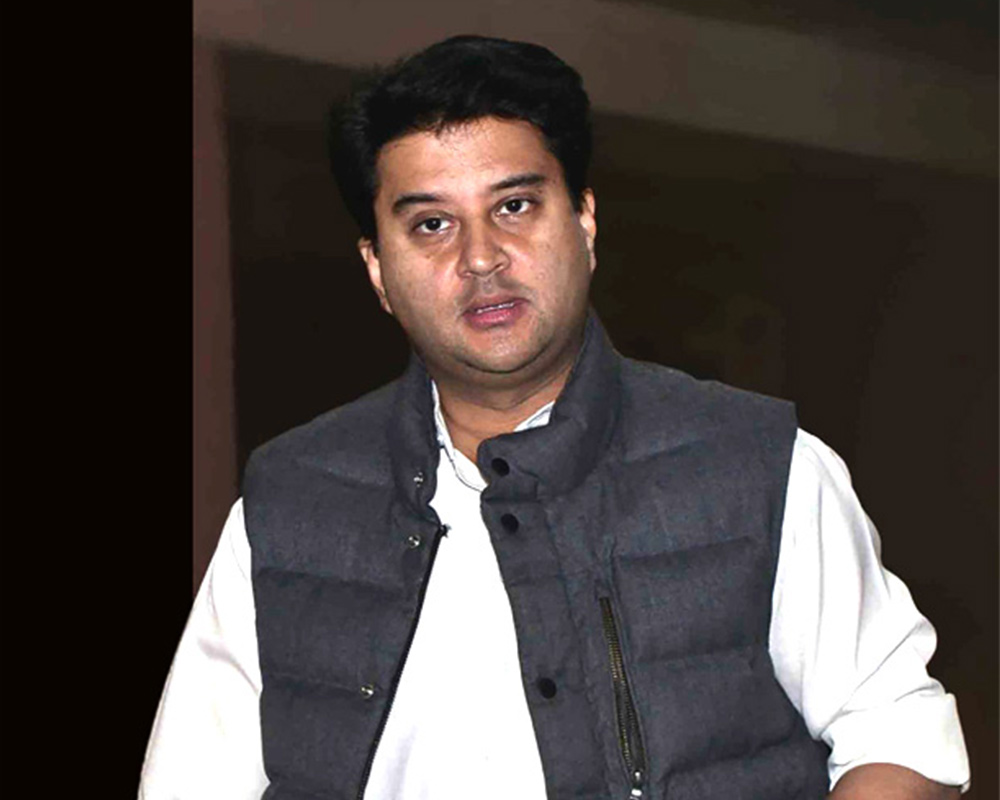An illusory aura continues to surround some ‘majestic’ politicians until their own drastic action impels one to carefully deconstruct their persona. Jyotiraditya Scindia is one such politician. His dramatic defection from the Congress to the BJP has caused a massive flutter in politics. Political pundits across the spectrum are analysing his move. Their analyses betray a rare convergence of view that wronged by the Congress, the Gwalior ‘Maharaj’ had little choice but to jump onto Modi’s bandwagon “to serve the country”.
Liberals are blaming Rahul Gandhi’s indifference, Kamal Nath’s neglect and Digvijay Singh’s machinations for the Congress’s bright star quitting the Grand Old Party. Modi bhakts are ecstatic that late Vije Raje Scindia’s grandson has finally landed in the party to which he ideologically belonged to, and, thus, he has atoned for the sins of his wayward father late Madhavrao Scindia who defied his mother and died in a wrong party.
But the truth about Jyotiraditya is something else; it is bitter. The truth is that the scion of the erstwhile Gwalior state is the most overrated politician in India. A simple fact-check would testify that.
Can anyone name another politician—Dr Manmohan Singh is an exception because the economist was an accidental Prime Minister—who got more than Scindia in a small span of 17 years? He inherited Madhavrao’s legacy and won handsomely from the seat his father represented till his tragic death in a plane crash in 2001. At only 49, Jyotiraditya was a four-term MP, a two-time Union Minister, a CWC member, in-charge of Western UP and a power centre in Madhya Pradesh. He could have chosen to be the deputy Chief Minister like Sachin Pilot, if he so wished, when the Congress rode back to power after 15 long years in Madhya Pradesh, which strangely, he did not.
Compare his phenomenal political trajectory with that of Kamal Nath and Digvijay Singh, the two politicians being blamed for Scindia leaving the Congress. Kamal Nath was first elected from Chhindwara in 1980. The then Prime Minister Indira Gandhi had introduced him to the electorate as her third son—he was so close to the Gandhi family. Yet, it took over a decade before Nath was made a Union minister. He found a berth in the Narsimha Rao government as a junior minister.
Jyotiraditya’s defection to BJP marks the third desertion of the Congress by a member of the erstwhile Gwalior royal family, known for its political and legal disputes often centered around enormous wealth in its possession
Digvijay was elected to the state assembly in 1977 and made a junior minister in Arjun Singh government after winning his Raghogarh seat a second time in 1980. When he became the Chief Minister, Digvijay had already had 16 years of parliamentary career behind him. Kamal Nath had to spend 38 years in Parliament when he was finally asked to head the Congress government in 2018. Yet, Scindia nurtured a grouse that he was not given his due.
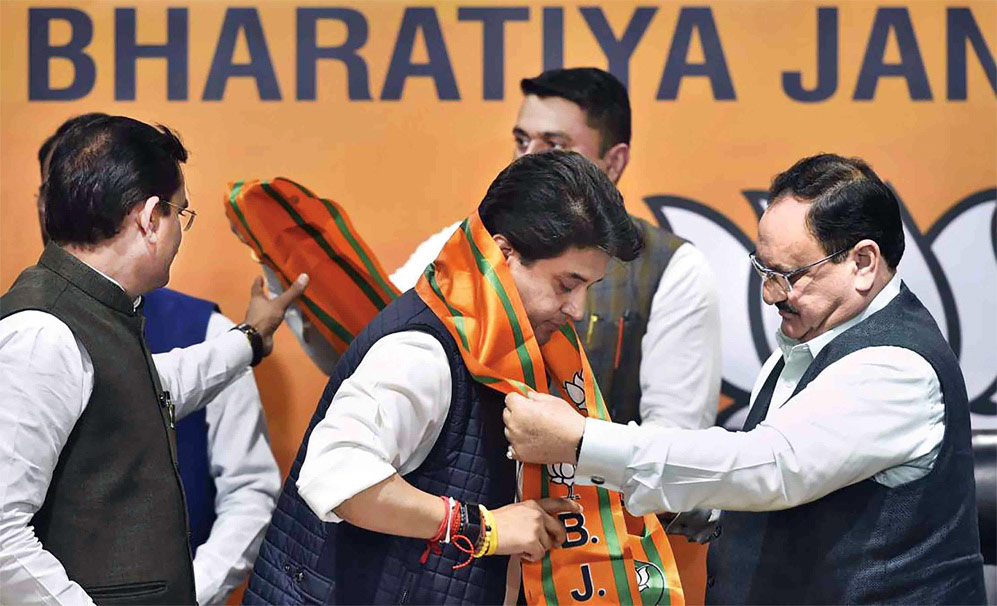
Scindia had premised his claim to the Chief Minister’s post, which was denied to him, on the assumption that he had emerged as the most acceptable leader among the masses in the run up to the Madhya Pradesh assembly election in 2018. It was a tendentious reading of the people’s mood. The fact is that it was the ability of Congress leaders, including Scindia, to remain united that impressed the voters enough to lean towards the party in the election. Scindia was only one of the faces in the top trinity, the other two being Kamal Nath and Digvijay Singh.
Of course, Scindia’s rigorous campaigning yielded good results for the Congress in his Gwalior-Chambal bastion where the party won 26 out of 34 seats. But Madhya Pradesh has 230 seats and the Scindia’s political citadel comprises only 15 per cent of the total number. Moreover, the junior Scindia‘s influence in the region is primarily due to his father’s legacy which he was able to sustain in the election. Like father, Jyotiraditya picked up loyalists on the basis of their devotion to the palace. Congress didn’t matter, its ideology less so. As the political tidings favoured the Congress, Scindia’s handpicked loyalists won in good number and credit is apportioned to him. However, when the anti-Congress mood was strong, as was the case in the last 15 years of the BJP rule, the blame was put on the party’s doorstep and not on Scindia. He had headed the Congress campaign committee in the 2013 election too when the party bit the dust but Scindia’s aura remained unscathed. While other leaders, particularly Digvijay Singh, were severely accused of sinking the party owing to their omissions and commissions, Scindia got away with mild rap on the knuckles.
Despite being a leader of a small region which swum and sunk with rest of Madhya Pradesh in electoral waters in successive elections, Scindia has managed to create an impression that he is cut above other Congress leaders with greater influence in the state such as Digvijay Singh and Kamal Nath. He has achieved this remarkable feat because of a combination of factors. His strikingly telegenic looks, networking in high places and proximity with the Gandhi family stood with him in good stead. He has friends across the political spectrum in politics, media and corporate world. Being scion of a royal family is an added attraction which he has exploited to the hilt to cast a charm offensive.
HOWEVER, when the chips were down, he opted for softer option of joining the BJP instead of standing majestically tall and alone with all those great attributes the media had endowed him with.
Jyotiraditya too could possibly have launched his own regional outfit if he was feeling marginalised within the Congress, like Mamata Banerjee and Sharad Pawar had done. But it is apparent that he did not have much support in Madhya Pradesh to take the risk of launching a party of his own.
For all the projected mass appeal, Jyotiraditya decided to join BJP than launch a party like his father. Maybe because MP Vikas Congress, the party Madhavrao had floated, managed to win just two Lok Sabha seats, unlike parties of other Congress rebel heavyweights such as Arjun Singh-ND Tiwari, Sharad Pawar, Mamata Banerjee, K Karunakaran, AK Antony, GK Moopanar and Jaganmohan Reddy who had a much higher degree of success. Having lost the last LS poll, Jyotiraditya wants to rebuild his career in the BJP by toppling the Congress government in MP.
One man cabinet
April 2020 at Raj Bhawan, After running one man show finally the cabinet was formed with the oath taking ceremony on 21st Bhopal. Total five ministers inducted in the cabinet.
Indian political history has no such precedence as is being seen in the central Indian state of MP. In the unparalleled dramatic turn of events in March, Shivraj was elected Chief Minister once again, thanks to the shock treatment Jyotiraditya Scindia gave to Kamal Nath. Scindia not only joined the BJP in a surprise and secret move, he took along with him as many as 22 senior Congress MLAs such as Tulsiram Silawat and Bisahulal Singh, among others. That brought about the sudden fall of a minority government of the Chhindwara strongman in just 15 months.While it is expected that Scindia would soon go to the Upper House of the Parliament on a BJP ticket and some of his staunch supporters, many of whom were ministers in the Nath cabinet, would be sworn in as ministers by Shivraj, nothing of that sort has happened yet. The obvious reason is the global pandemic that has stalled everything. Except Shivraj!
Shivraj, after consulting top BJP leaders, not only took the oath alone on March 23, until April 15 he had not included a single minister in his cabinet. He has thus made a kind of record by remaining a “one-man cabinet” of this large state, battling Corona virus for over 22 days and taking important decisions one after the other. The state was locked-down on the same day when he was sworn in by an order of district collector, unlike other states, and Section 144 was in force all over in Bhopal. But the historic change of power took place the same evening.
The obvious reason (for not including ministers), of course, is the deadly virus and situations that have arisen out of national lockdown that was declared by the Prime Minister Narendra Modi on March 24. But critics point out to three important developments in this regard. First, Chauhan was elected the legislature party chief with large number of party MLAs physically present at the BJP office in what was dubbed as first such video conference meeting in which central observers participated from Delhi via videos. That was March 23. Second, he drove straight to Raj Bhawan in a splashy car with Narottam Mishra, a formidable contender for the CM’s post, for his swearing-in around 9 pm. About 80 MLAs and supporters followed him, defying Section 144 and social distancing rules, in buses—about six km from the BJP office.
Third, Shivraj ‘won’ the confidence vote on the floor of the Assembly with no Congress MLAs being present and BJP winning the confidence vote unanimously on March 25. SP, BSP and independents all supported BJP. Earlier they had supported Congress.
Now, many are asking how can a government work with just one person taking all decisions? Strangely, the unprecedented pandemic phase is being dealt without a Health Minister or Home Minister or a Food and Civil Supplies ministers. To make matters worse, a large number of government officials have been infected, including principal secretary Pallavi Jain who is now quarantined.
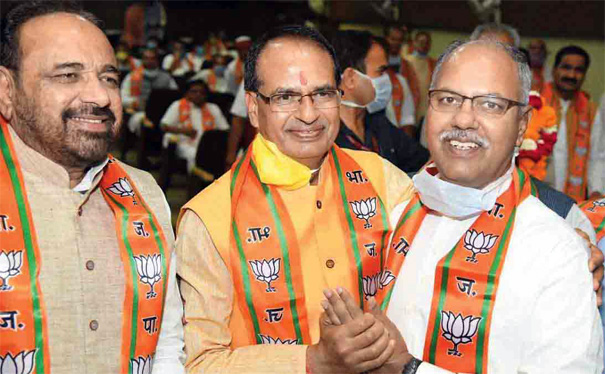
But Shivraj is unfazed. He is running government confidently as if nothing unusual has happened. He quickly removed Gopal Reddy, a 1985 batch IAS officer as chief secretary and installed Iqbal Singh Bains, Reddy’s batchmate. Bains has been twice the principal secretary of Chauhan in his earlier stints as CM. Reddy could remain CS for just about 10 days. He had replaced SR Mohanty (1982) who was to superannuate on March 31. After that he was set to be the chairman of the State Electricity Regulatory Commission. But with Shivraj as CM, Mohanty who steered the bureaucracy well for 15 months, has little or no chance of getting that 5-year long cushy assignment. But Reddy too is unfortunate—he has not been given any posting by Shivraj in the past 23 days, till the time of writing these lines.
With national lockdown extended until May 3, all political, administrative, financial and Corona-related decisions are being taken by Shivraj and his trusted chief secretary. Most meetings in the secretariat are being held via video conferencing. Only a few top principal secretaries and additional chief secretaries are seen in the meeting, along with CS and DGP Vivek Johari, who quit BSF top job to become DG of the state in early March. He will continue for two years, thanks to an SC order that allows states DGPs to have a clear two-year term in office.
In the light of the lockdown and social (physical) distancing orders, the Rajya Sabha polls, scheduled to be held on March 26, were put off, making among others, Scindia a bit nervous. It is said that once he enters the RS, he would be made a minister in the Modi cabinet as part of the unwritten deal struck between him and the BJP high command.
weights such as Arjun Singh-ND Tiwari, Sharad Pawar, Mamata Banerjee, K Karunakaran, AK Antony, GK Moopanar and Jaganmohan Reddy who had a much higher degree of success. Having lost the last LS poll, Jyotiraditya wants to rebuild his career in the BJP by toppling the Congress government in MP.
An overwhelming majority of the elected MLAs had opted for Kamal Nath as the Chief Minister and Scindia did not have the support of more than two dozen MLAs. Even now when he chose to join the BJP, the number of Congress MLAs that he managed to wean away is less than a quarter of the Congress MLAs in the state. His switch, therefore, smacks of self-serving opportunism. The ‘Maharaja’s’ lack of ideological conviction has been manifest in his approval of BJP’s abrogation of Article 370 and his silence on all contentious legislations and decisions brought out by the Modi regime, such as the CAA-NPR-NRC.
SCINDIA’S switch to the BJP is, to all appearance, the result of his inability to imagine a politics outside of power. Given his model of politics, this is personally a canny move on his part. For the foreseeable future, the BJP will be a dominant force in national politics. He will once again be elevated to the position where he can be a patron and secure his other interests within a predictable matrix of power in Delhi and Madhya Pradesh.

While the writing had been on the wall, little had the Congress leaders imagined that the former Union minister, who enjoyed disproportionately high clout to his real prowess and also proximity to the Gandhi family, would desert the Congress.
Contrary to perception that he quit the party due to persistent neglect by Chief Minister Kamal Nath, the Maharaj had began toying with the idea of leaving the Congress soon after he was denied chief ministership.
Rahul Gandhi had offered deputy chief ministership to Scindia after the assembly poll results were out in December 2018. Scindia declined but said he would nominate someone for the deputy’s post. Rahul Gandhi then reportedly said that in that case, Kamal Nath could also nominate his second deputy.
The fact is that it was ability of the Congress leaders, including Scindia, to remain united that impressed the voters enough to lean towards the party in the election. Scindia was only one of the faces in the top trinity, the other two being Kamal Nath and Digvijay Singh
Scindia was later appointed Congress general secretary in-charge of western Uttar Pradesh—a punishment posting, in bureaucratic terms, as the party has no base there. Since then his supporters felt that the party leadership chose Kamal Nath over Jyotiraditya fearing he would outshine Rahul Gandhi as both were of the same age group. The fear was grossly misplaced though. After the 2019 debacle, Jyotiraditya found himself shadow-boxing much like the other leaders as dissensions rocked the party and an adamant Rahul Gandhi refused to take back his resignation.
For Scindia, the election proved a double whammy; he lost from Guna seat. Scindia’s political clout is entirely based on his electoral invincibility and massive inherited wealth which guaranteed him the position of the perpetual disburser of power and patronage to his loyalists. In the wake of his 2019 defeat that aura of invincibility was shattered.
Immediately after that, he broke ranks with the Congress, to support the authoritarian abrogation of Article 370. This was followed by his support of the CAA–NRC which is the most profound attack on the Constitutional ideals of our Republic. Other ominous signs of Jyotiraditya’s seething revolt were apparent. In January 2019, he had a meeting with Shivraj Singh Chouhan, which both described as courtesy call. Jyotiraditya erased references to the posts he held with the Congress from his Twitter handle (the “former Union Minister, MP of Guna” is now described as “public servant, cricket enthusiast”). He also let known his unhappiness with the survey of damage caused by the 2019 floods and claimed that poll promises were un-kept.
THEN in August, Scindia’s dissent amplified nationally, with his backing for diluting Article 370, opposed by the Congress in Parliament. The BJP in Bhind put up a poster congratulating him for supporting the Centre’s decision, positioning Scindia, Union Home Minister Amit Shah and Modi in the same frame. Leader of the Opposition Gopal Bhargava even called upon him to quit the party. But Scindia bided for his time to strike.
Daunting task ahead for Chouhan
SHIVRAJ Singh Chouhan is back as chief minister for a fourth time. First time he was chosen in November 2005 as Babulal Gaur’s successor. Second and third time he led the BJP to victory in 2008 and 2013 assembly elections. Fourth time he emerged lucky again as the BJP succeeded in toppling the 15-month-old Kamal Nath government with the help of defector Jyotiraditya Scindia and his 22 supporter MLAs.
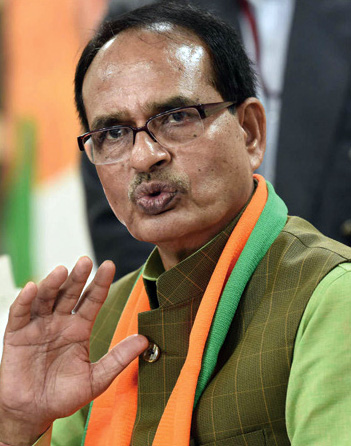
Unlike his 13 years as chief minister, Chouhan has daunting task ahead of managing a rag-tag team which is just above the majority mark. Stability of his wafer-thin majority will largely depend on outcome of the 25 by elections caused by the resignation of the Congress MLAs who owe allegiance to Scindia. The by- elections will be held in six months and till then a spell of uncertainty is likely to continue.
Shivraj Singh Chouhan’s ability to manage contradictions within the government is untested yet. He has been lucky to have helmed the government for 13 years which enjoyed overwhelming majority. Plus, the BJP high command had been supportive, despite reports of Prime Minister Narendra Modi being wary of Chouhan, a protégé of LK Advani. A shrewd politician that he is, Chouhan not only saw systematic marginalisation of his detractors within the party but also succeeded in endearing himself to Modi – Amit Shah-duo. He has described Modi as God’s gift to India several times to please the Prime Minister.
Chouhan is carrying a huge baggage of the omissions and commissions in his 13-year-rule that had made him so unpopular that the BJP lost power to the Congress in the 2018 assembly elections. Vyapam, of course, is one of the scams that still haunt him, even though the courts gave him a clean chit.
In Madhya Pradesh, he had reasons to feel acutely vulnerable after shocking defeat in Guna as two veterans Kamal Nath and Digvijaya Singh joined forces against him.
Kamal Nath had succeeded in getting his son Nakul elected from Chhindwara while Digvijay Singh managed to get his son Jaivardhan Singh a berth in the Congress ministry. Scindia felt that his future was bleak in the MP Congress as Nakul Nath and Jaivardhan have ascended in the state’s firmament as two rising stars.
While Nakul has not exhibited his political ambitions to reach beyond the pocket burrow of Chhindwara, Jaivardhan is being meticulously groomed by his father Digvijay Singh, who has a following across Madhya Pradesh.
SCINDIA could not be unaware of the history of the protracted political battle between his father and late Arjun Singh, the political mentor of Digvijay Singh. Arjun Singh overcame Madhavrao’s political challenges to anoint his protégé Digvijay Singh Chief Minister in 1993. His national appeal notwithstanding, Madhavrao could never expand his base in Madhya Pradesh outside Chambal-Gwalior. First Arjun Singh and then Digvijay Singh saw to it that Gwalior Maharaj’s influence remained confined to his erstwhile princely state. Madhavrao too didn’t try hard to spread his charm outside the Gwalior region.
After the 2018 assembly election, Jyotiraditya developed overweening ambition to emerge as a pan-Madhya Pradesh leader at the expense of both Kamal Nath and Digvijay Singh. But the veteran duo frustrated the young Maharaj’s manoeuvrings.
Kamal Nath refused to reach out to Scindia and virtually kept him isolated. The Chief Minister even stalled Scindia’s claim for the post of the state Congress chief. Senior Congress leader Digvijaya Singh, never known as a Scindia sympathiser, sought to convince the CM of the need to co-opt the young leader but Kamal Nath didn’t pay any heed.
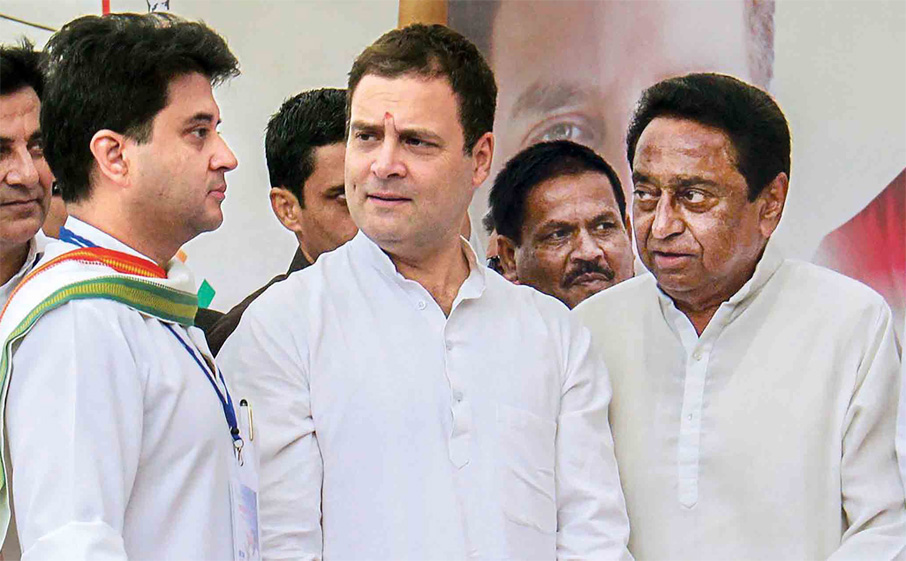
The BJP noticed with alacrity an ally in Scindia in October last year when he claimed farm loan waiver, a poll promise that former party chief Rahul Gandhi had said would be kept within 10 days of coming to power, was not fulfilled. Chouhan then trained guns on the Chief Minister telling him “your own people are showing you the mirror”.
It’s not just about Kamal Nath. Scindia has been upset with Sonia and Rahul Gandhi—not just because of the way they allowed him to be undermined in the party, but also because he saw the Congress going nowhere under their leadership.
In his resignation letter, he revealed that he had been considering this switch for the last one year and therefore, the supposed inaccessibility of Rahul Gandhi, does not hold water. Gandhi, who maintained a stoic silence through the entire episode, broke it momentarily to let it be known to the public that of all people Scindia could have called upon him at all times.
It’s not just about Kamal Nath. Scindia has been upset with Sonia and Rahul Gandhi—not just because of the way they allowed him to be undermined in the party, but also because he saw the Congress going nowhere under their leadership
BJP was swift to sense the discomfort and worked on it with Scindia’s aunt Yashodhara Raje being instrumental in convincing her nephew to ‘come back home’. Another leader active in the exercise was BJP’s national spokesperson Zafar Islam, an old friend of Jyotiraditya, who shares a good rapport with him.
At the wedding of BJP president JP Nadda’s son, Home Minister Amit Shah had a detailed discussion with Zafar Islam. What triggered the final move was the public spat that Scindia had with Chief Minister Kamal Nath in February.
“It is impossible that Congress party makes a promise and does not fulfill it. If Congress has promised something then it is very important to fulfill it…nahi to sadak par utarna padega (otherwise we’ll take to the streets),” he told mediapersons on February 15. Responding to the media over Jyotiraditya’s threat to protest, Kamal Nath said: “toh utar jayein (do it)”.
JYOTIRADITYA’S defection to BJP marks the third desertion of the Congress by a member of the erstwhile Gwalior royal family, known for its political and legal disputes often centered around enormous wealth in its possession.
Jyotiraditya’s paternal grandmother Vije Raje Scindia was the first to quit Congress in the ‘60s. His father Madhavrao Scindia too left Congress in mid-1990s, after alleging that Prime Minister PV Narasimha Rao had implicated him in the Jain hawala case, floated Madhya Pradesh Vikas Congress (MPVC), but returned two years later to emerge as a senior Congress leader till his death in a plane crash. His aunts, Vasundhara Raje and Yashodhara Raje, and cousin Dushyant are all now in BJP.
His exit from the Congress is thus the culmination of a long and twisted family legacy that has seen this politician return to the roots of his grandmother, the Rajmata. But his entry in the BJP could be fraught with far more complexities and tricky internal dynamics than the party has bargained for.
Chouhan’s ‘Vibhishan’ remark about Scindia during a passionate speech on March 12 gives more than a glimpse into the times to come. Chouhan and Scindia gave dramatic, impassioned speeches, showering praise on each other. But there was as much to read between the lines. Chouhan referred to Scindia as Vibhishan—mythological character Raavan’s younger brother, who deserted his brother to join the rival camp. “Kamal Nath, till we don’t destroy your Lanka of terror and corruption, we will not sit in peace. To destroy Lanka, one needs Vibhishan. Today Jyotiraditya Scindia is with us,” Chouhan said.
The reference to Vibhishan—someone who turned against his own family—is not the most flattering and for the ‘Maharaj of Gwalior’, the tag of a betrayer can hardly be desirable. Scindia, meanwhile, also seems in no mood to play second-fiddle to Chouhan. He made sure he talked of himself as an equal and as a politician as rooted as the BJP stalwart.
For now, the party’s top leadership is clear about how it wants to handle the situation. The idea is to give Jyotiraditya a more national role, along with the Rajya Sabha seat, while ensuring Chouhan remains the king in Madhya Pradesh. However, it may not be as easy and seamless. Scindia has his own ambitions and his big grouse in the Congress was being sidelined by the Kamal Nath-Digvijaya Singh duo, and being forced to remain limited to the Gwalior-Chambal region, despite having a youth appeal across the state.










































